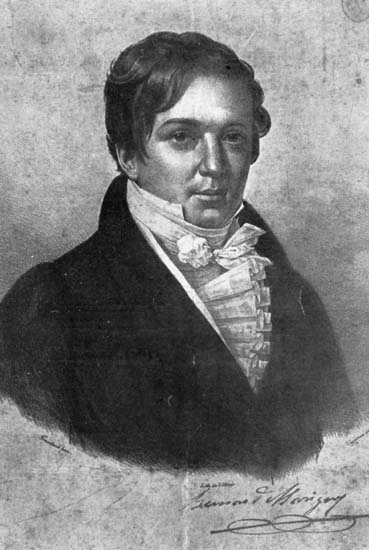
Bernard Marigny (1785-1868) was, according to author Liliane Crété, "a kind of early nineteenth-century playboy." During Bernard's youth, the Duc d'Orleans, later King Louis Philippe, was a house guest of the Marigny family. It is quite li kely that the younger Marigny enjoyed many of the parties thrown by the Creole gentry in honor of the royal visitor. In later years Bernard would spend a fortune on gambling and other attractions of the "good life" in New Orleans. When he died in poverty three years after the Civil War, Marigny was celebrated as the last of the great Creoles. [Mandeville, A Historical Compendium (New Orleans, 1918)]
...The Americans ... looked down upon the Creoles as an effete, alien race and called them "Johnny Crapauds" a term of
reproach the British had long fastened upon the French because of their supposed predilection for frogs as an article of
diet.
When the Yankees saw the Creoles huddled about a table excitedly playing Marigny's new game of Hazard,
wagering money, slaves, plantations, and even dull gold mistresses on the turn of the dice, they slurringly referred to the
pastime as "Johnny Cr
apaud's" game. It's popularity, however, spread like yellow fever in a mosquito swamp. Before long it became the
passionate obsession of the whole town, of Americans and Creoles alike, and was rechristened, so it was said,
"crapaud's" and later abbreviate
d to "craps."
...never before has the Crescent City been sung as the birthplace of the man who first brought Craps to America. And yet
to Bernard Xavier Philippe de Marigny de Mandeville, born in New Orleans in 1785, belongs this honor. A swaggering,
gallant, fantastic
figure, this son of a wealthy Creole planter was left at sixteen a fabulously rich orphan. His every whim indulged while
his father was alive, he became as wild and headstrong after his death as an unbacked mustang, and his guardian,
abandoning all idea
of control, finally shipped him to England, hoping that life abroad might mend his manners; but in London Bernard's
dissipations became only more pyrotechnic, and he spent most of his time at Almack's and other famous gambling places
where a novel dice ga
me from France, called Hazard, was all the rage. Bad reports of his dissolute living and phrenetic gambling came
to his guardian's ears and Bernard was ordered home, where he immediately taught his Creole friends this new alluring
game.